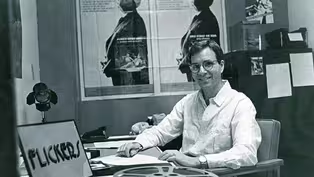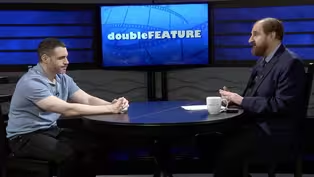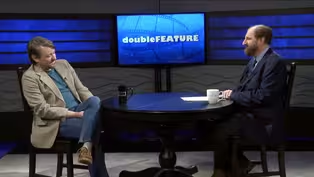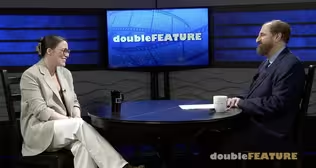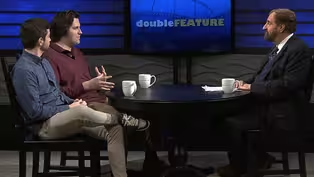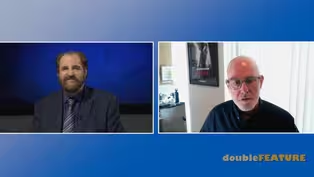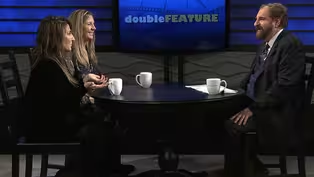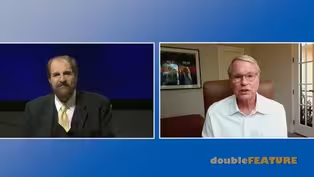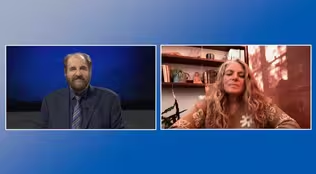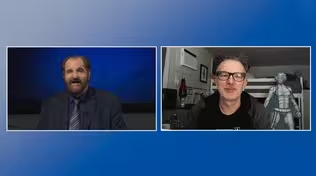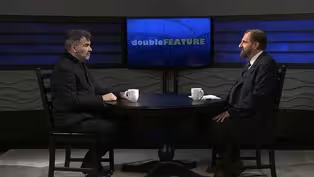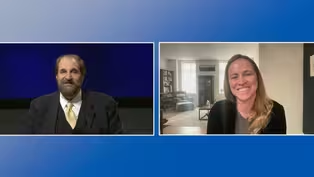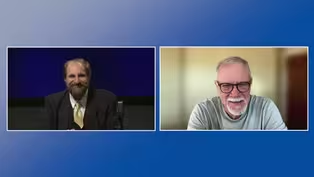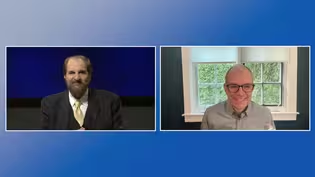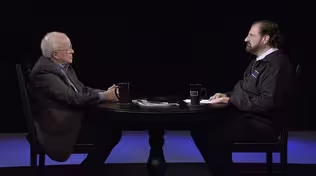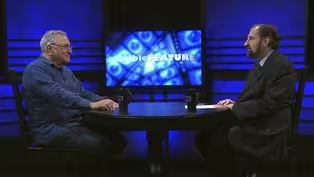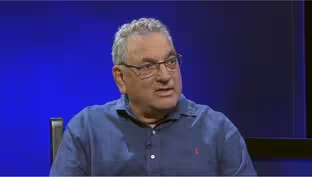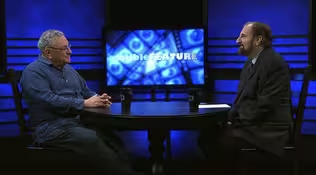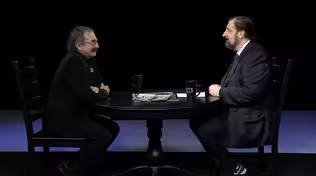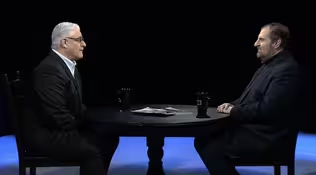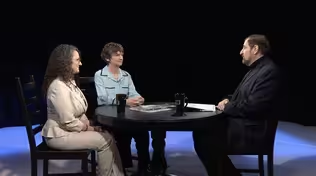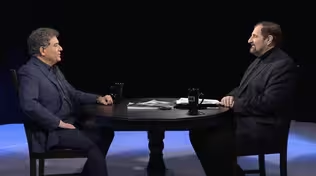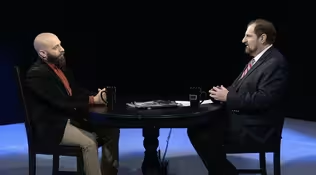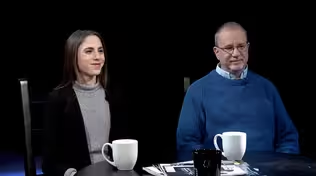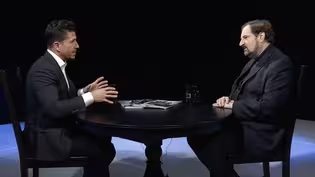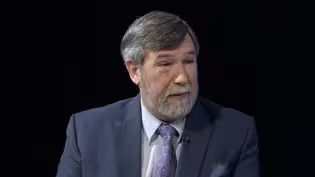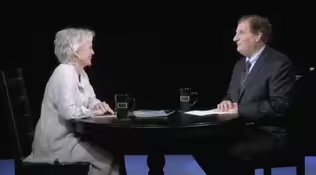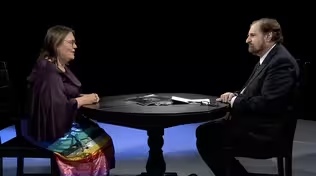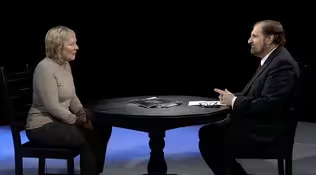
The Legacy of George T. Marshall
Clip | 44m 58sVideo has Closed Captions
Remembering the founder of Flickers, George T. Marshall.
Steven Feinberg, Executive Director of the Rhode Island Film and TV Office, and Shawn Quirk, Executive Director of The Flicker Rhode Island International Film Festival discuss the legacy of George T. Marshall. George was an educator and founder for Flickers, and he was an executive producer for this very show, doubleFEATURE.
Problems playing video? | Closed Captioning Feedback
Problems playing video? | Closed Captioning Feedback
doubleFEATURE is a local public television program presented by Rhode Island PBS

The Legacy of George T. Marshall
Clip | 44m 58sVideo has Closed Captions
Steven Feinberg, Executive Director of the Rhode Island Film and TV Office, and Shawn Quirk, Executive Director of The Flicker Rhode Island International Film Festival discuss the legacy of George T. Marshall. George was an educator and founder for Flickers, and he was an executive producer for this very show, doubleFEATURE.
Problems playing video? | Closed Captioning Feedback
How to Watch doubleFEATURE
doubleFEATURE is available to stream on pbs.org and the free PBS App, available on iPhone, Apple TV, Android TV, Android smartphones, Amazon Fire TV, Amazon Fire Tablet, Roku, Samsung Smart TV, and Vizio.
(film reel whirring) (dramatic music) - Hi, I'm Steven Feinberg, executive director of the Rhode Island Film and Television Office.
Tonight, we are dedicating our entire show to George T. Marshall.
Not only was George a great friend and devoted husband, he was an educator and founder of the venerable Rhode Island International Film Festival.
Plus, he was an executive producer of this very show, "Double Feature."
I'd like to welcome the current executive director of the festival and George's close friend, Shawn Quirk, as we celebrate the amazing life and work of George T. Marshall.
Welcome, Shawn.
- Thanks, Steven.
Great to be here.
- Great to be here, right on a night that we celebrate the life and legacy of George Marshall.
He was a creator of the show with us and executive producer, and the original founder of "Flickers," which became the Rhode Island International Film Festival, now shockingly in its 42nd year.
- He's done really a whole era of work, and he's shaped a lot generations of filmmakers and students.
And really, the entire film ecosystem in Rhode Island has been shaped by him in many ways.
- And he was a mentor to you, obviously.
- He was.
- And I thought of George as a brother when we met, and it was really about working in harmony to celebrate the work of the local film community.
Also, giving opportunities for our local audience members to be educated by films from around the world.
And with your work, and curation, and George's organization, you guys helped to bring in filmmakers from around the world to their first port of call to the United States, Providence, Rhode Island, and you helped showcase their work on an excellent platform.
To be able to show a film...
If I'm a filmmaker at PPAC, or at the RISD Museum, or the East Greenwich Odeum, or in Westerly, or the Vets Auditor...
I mean, you guys give and have given filmmakers opportunities that maybe would not have come if not for your work and George's work.
- And it's important to note that Flickers is... Has been around since the early 80s, we're in our 42nd edition, and it started originally as the Newport Film Society.
- Yeah.
- And that was an organization that would show retrospective works from around the world.
- 16 millimeter, right?
- 16 millimeter, correct.
And over time, that organization would grow as the membership grew.
And, then up until the 90s, 1997, we had our first international film festival, which was originally spawned from a Flickers event, which was the Jubilé Franco-Américain, French Canadian Arts Festival, that would also be celebrating French Canadian cinema.
And we, of course, were having that in Woonsocket at the time.
And so, originally, that was our first home for the festival.
- And then you had... You had the movie... Was it "Something about Mary"?
- "Something About Mary."
- And the Farrelly Brothers, and that was in Woonsocket, and that was a big to-do.
- They had their premiere at the Stadium Theater.
- Right.
And I remember also...
This is really important, that this idea of the... What became the Rhode Island International Film Festival is now so prestigious across the world.
It's highly respected because it is not only Academy Award-sanctioned, right?
It's British Academy Award-sanctioned.
Canadian!
- Canadian.
- And Spain?
- Goya, which is Spanish Academy Award.
- Right, so the films that premier at the Rhode Island International Film Festival in the categories of live action short film and animated short film can qualify for the Academy Awards, and you've had quite a few winners.
- We've had over 85 nominees and a total of 12 wins.
- And that... Wasn't that the vision that George was hoping for and that maybe it exceeded his dreams of what became of the film festival?
- Well, George was always one to really celebrate undiscovered talent, both on the screen and off the screen.
- Yeah.
- Just in life in general.
And he was really about making dreams come true.
So his goal with the festival was really to shine a spotlight on talented filmmakers that really hadn't had a platform prior.
And through creating the festival and through creating that platform, he literally was creating new stars of the industry.
- Right.
I mean, one of 'em... One of was Denis Villeneuve.
- Denis Villeneuve.
- Who did "Dune" and "Blade Runner," and one of George's favorite films, what's it called?
"The Next Floor," right?
- "Next Floor," which had its world premiere at the Rhode Island International Film Festival as part of our opening night.
- I remember that.
- At PPAC.
- At PPAC, I remember.
Why don't we share with the audience one of George's favorite films, "The Next Floor?"
(film reel whirring) (somber piano music) (suspenseful music) (utensils clanking) (classical music) (floors creaking) (dramatic music) (screaming) - Next floor.
(waitstaff chattering) (classical music) (utensils clanking) (floors creaking) (crashing) Next floor.
(waitstaff chattering) (speaking foreign language) Next floor.
(waitstaff chattering) (floor creaking) (speaking foreign language) Next floor.
(waitstaff chattering) (footsteps approaching) (classical music) (suspenseful music) (chewing noises) (background chatter) (suspenseful music) (screaming) (crashing noises) (screaming) (suspenseful music) (classical music) - I can see why George loved that film, and-- - It's just so moving and it's so thrilling.
I mean, it's...
It gets me every time.
I mean, the sound effects of that film are just like outstanding.
- And that launched, Denis Villeneuve?
- That started let...
Launched his career, so-- - Launched his career.
And then, he, like, Blade...
The "Blade Runner" sequel, the "Dune" films.
There was that other film with the aliens and...
I forgot what it was called.
- "Arrival."
- "Arrival," yes.
Just, he's an outstanding filmmaker.
- One of the best.
He's gonna go down in history as a Kubrick, in a sense, of his era.
He's very technically precise.
- And his film premiered at the Rhode Island International Film Festival.
- Yes.
- The other thing that George did is he had a show called "Between Takes."
And that, over time, evolved into what we now have as "Double Feature," of which we help co-create and add a little bit of spice to the show.
And when George and I would talk about films, one of my favorite films, and I think was yours as well, and I know was George's 'cause he was the one that said, "You're gonna love this.
"Watch it whenever you wake up," and that was a German film called "The Present."
Let's show the audience "The Present."
- It's the perfect short animation.
It's wonderful.
(film reel whirring) (gunfire) - Hey, sweetie.
Sorry I got home so late.
I got (indistinct) to put something up after work.
- Mom!
- It's such a beautiful day outside.
You should let some sun inside.
That's better.
Why don't you stop playing and open the present I got for you?
(telephone ringing) - For me?
- Hello?
Oh, yes sir.
I don't know why you didn't get the papers.
I put them on your desk before I left.
- Okay.
Whoa, cool!
(dog barking) Hmm.
Ugh.
She's gotta be kidding me.
Get lost.
(upbeat music) (banging noise) Hm.
Hm.
(dog barking) Mom, we'll be outside.
("The Present" ft. Septemberkind by Zealand) ♪ Sunlight illuminates the dust ♪ ♪ My heart sleeps beneath the earth ♪ ♪ Wake me up again ♪ ♪ Time to move on from the rain ♪ - I love that film.
I love that film because of its quality of the animation, its humor, and-- - And the music is perfect.
- Music.
And then, the poignancy.
- Yeah.
- Great movie.
- That final reveal gets me every time.
- Yeah.
I think the other thing that...
When we talk about George, is that he was a phenomenal educator.
Roger Williams University, he taught classes.
He had guests come in.
- Rhode Island College.
- Rhode Island College.
URI, on the board of directors, or Board of Governors.
- He created film programs in all three of those schools.
- Yes, yes.
He worked with Tom Zorabedian at the University of Rhode Island and Winnie Burnell, Dr. Winnie Burnell.
I think George was...
I think he was a treasure.
And I think he's been underappreciated for the amount of work and human beings that he's touched.
And one of the things I love, and you're aware of this, you're there every time, when the awards are given out on the Sunday for the film festival and the filmmakers are there, and he always says that "You are part of the family, "you are always welcome back.
"Even if you don't have a film "and you want to come, "you're part of the family.
"And you're a winner.
"And you're..." And George, as you said, was a dream maker.
I just, I think the world of him, I miss him tremendously.
I think one of the legacies...
The film that you curated that came from London, England was... - I mean, another discovery, and that was "The Silent Child."
And that was an amazing film that we had the world premiere of, and one that we're gonna share with you right now.
- And that became an Academy Award winner.
- It won the grand prize at the festival.
The whole cast and crew were there.
And then, it went on to be qualify... Qualify for the Oscar because of that award, and then it ended up winning the Oscar.
- It did.
So why don't we share one of George Marshall's favorite films that ever came through the film festival, the beautiful and award-winning "Silent Child."
(film reel whirring) (somber music) (birds chirping) - What time's cello tonight?
- 06:00.
- Oh God, you'll have to run him, Paul.
Pip has ballet at 5:30.
I can't split myself in two.
- Yeah, okay, chill.
That's fine.
- It sounds so weird when old people say chill.
- Charming.
- What time's the help arriving?
Joanne is arriving at... Yep, it's time to go.
Grab your bags, please.
Oh God, she's early.
Paul, can you go to the door and take the baby with you?
- I'm leaving now, I'm already late.
- Hi, I was just about to knock.
I'm Joanne.
- Yes.
Suzanne!
She'll be done in a minute.
Thanks for helping us out.
We have quite low expectations.
We just want her to be a little bit more confident in time for school.
- Right.
- Anyway.
- She has a hearing aid but she won't wear it.
- And I'm assuming there's no history of deafness on yours or your husband's side.
- No, we only found out she was deaf when she was three and a half, which probably makes me a bloody awful mother, but because she had a bit of hearing in her left ear that was overcompensating, apparently that's common.
- You're not an awful mother.
It's very common.
And you said she didn't qualify for a cochlear implant?
- No, which was a real blow.
- And what's her communication like?
Does she know any sign language or is it just lip reading?
- Just lip reading - And her speech?
- Not good.
- All right, well, I'll probably start with a combination of speech and sign language just to see where she's at.
A lot of children respond really well to sign 'cause it's less frustrating.
- I can't see that being the case.
Libby follows what we're saying really well.
- Right, well, I'm sure she'll be fine then.
- Stop, you idiot.
I'm on the phone.
- Okay, so make yourself a home.
Sit down if you like.
Libs, there's someone here to see you.
Libby, can I have the remote please?
Libby?
Libby, can I have the remote?
She's usually happy when she's watching TV.
She can be very difficult.
I mean, sometimes, we don't even know what's wrong with her.
- Is there any pattern to that happening?
- Oh, no.
You know what they're like at this age.
My other two were the same.
- Mom, my exam starts in 25 minutes.
- Yes, I'm coming!
Seb's got his GCSEs and he got A-stars in his mocks, so better not make him late.
Right, you got my mobile number.
I'll be back in a few hours to see how you got on.
You'll be brilliant.
Bye, Libby darling.
(somber music) How's it been?
- Yeah, good.
- I told you she was quiet.
- Yeah, does she ever interact?
- Yeah, she follows what we say really well.
Trust me, when Libby's unhappy, you'll know about it.
- Yeah, I think I'll just try with some more interactive stuff.
I've got quite a few books I think would be useful.
There is actually a-- - Hello?
Sorry.
Yeah, I've literally just walked in the door.
Can I call you back in five minutes?
Sorry.
Yeah.
Yeah, tomorrow.
I said yeah.
8:30, yeah?
Okay, don't worry.
Bye.
Sorry, that was Paul's mom.
She's a bloody nuisance.
- Oh, it's fine.
I'll just bring some stuff to try her with tomorrow.
Does she like the park?
- Well, I haven't taken her since she was tiny, but I'm sure she'd love it, yeah.
It's only five minutes away.
- Yeah, I saw it.
Great.
- Thanks, Joanne.
- Okay, bye.
(somber music) - Are you moving in?
- They're for Libby.
- She's inside with Sue.
She's in a good mood.
Libby, I mean.
Sue's never in a good mood.
- Hey!
- Oh hey.
Oh hey, Libby.
Oh sorry, the door was open-- - Looks like you're gonna have a busy day.
I'm so sorry, I've gotta shoot off again.
I've gotta take Paul's mom to the hospital.
- Oh, no worries.
- Bye Libs.
You be good.
See you later.
- Bye.
- Thank you.
(somber music) - Right, let's pack a bag.
Where's your bag?
Let's get you some orange juice then.
(ducks quacking) (birds chirping) - I just wondered how she'll get on with the sign language at school.
- How do you mean?
- Well, I'm not sure that many people know it.
- Well, she'd need to have an interpreter sat with her and extra support, and, well, I'm not trying to talk myself into a job but I'd be more than happy to help.
- Right, okay.
I'm just wondering if we should be focusing more on the lip reading rather than the sign language.
- Well, as it stands at the moment, Libby's gonna struggle with speech.
So combination of sign language and lip reading will have the best results.
Like, I know it can feel a bit alien, but the basics are actually really easy to learn.
Might be a nice thing to do as a family.
- I'm just not sure how doable that is at the moment.
Pip has ballet and Seb rehearses with the Midland Choir three times a week.
But we'll chat about it tomorrow.
I'll talk to Paul.
- Okay, great.
Right.
Thanks, Sue.
- I want her to speak, Paul.
And I've said to you she's not hearing anything we are saying.
(speaking over each other) - This girl come into our house, taken my daughter away from me... (somber music) - Seb, can you pass me the jam, please?
- There you go.
- Oh Sue, don't forget that letter, will you?
- Did you ever find your leather jacket?
- Yes, it was in the office.
- She's signing.
- She's probably hungry.
Can you pass me that butter, Seb?
- I think it means "orange juice."
Jo taught me some stuff.
- That's cool.
- Yeah, Jo's doing a good job.
You know, however many hairstyles you try, she's not gonna go out with you.
- Oh, talk with the devil.
- Quick, someone give him some hairwax.
- Shut up.
- Morning.
- Morning, Jo.
- Hello, hello.
- Jo, what do you think of Seb's hair?
It's cool.
- Right, it's time to go.
- Seb... - What is it, Libs?
What's she saying, television?
- No, I think she wants to look for treasure, so I'll sort that out.
- Get a move on, Pip.
Seb, can you bring my briefcase, please?
- Thank you.
Right, so I'm on the bloody hospital run again with Paul's mom today.
I think I mentioned last night, I'm gonna be a bit late again tonight.
More like six.
- Yeah, that's fine.
We'll have lots of fun.
- Bye, Libby.
Back again.
Sorry, can never leave.
I forgot my bloody purse.
- Hi, I'm Joanne.
I look after Libby.
- Oh hello, darling.
Is she being good for you?
- Libby?
Yeah, she's great.
She's so bright.
- Is she?
Do you think she'll be able to get a job one day?
- Yeah, I think she'll be able to have a career in whatever she likes.
- Oh, God bless her.
Her granddad was deaf, you know?
From birth.
He had a job as a cleaner.
I knew him.
- Really?
Libby's granddad?
- Mm hmm.
- Sorry, do you mean Paul's dad or Sue's dad?
- Neither, darling.
She's not Paul's, you know?
I told him he should have left but he never listens to his mother.
- Right, well, it was really nice to meet you.
- You too, dear.
- All right, then?
- Yeah, couldn't find... (wind blowing) - I know that she's progressing but I'm worried.
She's learning this language that I don't know and no one in her school will know.
When you have a child, you want them to be normal, you want them to be perfect.
- She is normal, Sue.
She's just deaf.
- Look, I know it's your area of expertise, but you must understand, I'm Libby's mother and I know what's best for her.
- Of course, you know best.
And it's just that schools don't always understand deafness, and you have to fight for the support sometimes, but it is out there.
- I know what I'm doing, Jo.
You must understand I've been a mother for a very long time, and I do appreciate your concern.
And Paul and I will arrange to go in and see the head.
I mean, do you think we'd send her to school without making sure everything was in place first?
(cell phone ringing) - Oh, hello.
- Hello, Joanne.
You okay?
- Yeah.
No, I'm fine.
I'm on the bike.
Is everything okay?
- It's just...
Sorry, this is a difficult thing to say, but Paul and I have been talking and we think it's best that Lib stops the sign language.
- Why?
- We think that speech therapy is a better route to take.
I'm really sorry-- - I don't understand.
She was doing so well.
- I know-- - For school, it's really important that she carries on with sign language and gets extra support.
- We've talked a lot about this, Jo, and we've actually been in to see the head, and they had a little deaf boy a few years ago and he's absolutely fine.
They know what they're doing.
- Look, I'm nearly here now.
Can I explain it to her?
'Cause she'll wonder where I am.
- Okay, class, open your books, write the date at the top, and we'll start the spelling test.
Number one, "there."
Number two, "hear."
(children playing) - Such a moving film, isn't it?
- Oh, beautiful.
And it was so--- - That last shot is just...
It's heartbreaking but it's so touching - And it was so nice to have the filmmakers attending the film festival, and seeing the response that they receive from the audience, and great film.
- They've been embraced by the entire film community.
- You've done a wonderful job, Shawn, curating, carrying the torch for George, and I know he'd be proud of you and the work you're doing for the Rhode Island International Film Festival and "Double Feature."
Thank you so much for being here to celebrate the life and legacy of our pal, George T. Marshall.
- Thank you, Steven.
And thank you for being one of his best friends.
You two are brothers.
- Thank you.
Yep, I love him and I miss him.
The Legacy of George T. Marshall
Video has Closed Captions
Clip | 44m 58s | Remembering the founder of Flickers, George T. Marshall. (44m 58s)
Video has Closed Captions
Clip | 44m 59s | Steven Feinberg interviews director, writer, and actor, Tom DeNucci. (44m 59s)
Video has Closed Captions
Clip | 45m 2s | Interview with Alex Berard. (45m 2s)
Video has Closed Captions
Clip | 44m 59s | Steven Feinberg interviews First AD, Emma Barber. (44m 59s)
Interview with Chad Verdi Jr. and Paul Luba
Video has Closed Captions
Clip | 45m 31s | DoubleFeature shows films from around the world and takes viewers behind the scenes. (45m 31s)
Video has Closed Captions
Clip | 41m 15s | DoubleFeature shows films from around the world and takes viewers behind the scenes. (41m 15s)
Interview with Angela Peri and Lisa Lobel
Video has Closed Captions
Clip | 45m 25s | Interview with Angela Peri and Lisa Lobel (45m 25s)
Video has Closed Captions
Clip | 45m 45s | Interview with Jerry Ketchem. (45m 45s)
Video has Closed Captions
Clip | 49m 15s | Steven Feinberg interviews award-winning filmmaker, Elyse Katz. (49m 15s)
Video has Closed Captions
Clip | 44m 30s | Steven Feinberg interviews storyboard artist, Martin L. Mercer. (44m 30s)
Video has Closed Captions
Clip | 45m 19s | Steven Feinberg interviews Providence Pictures' Gary Glassman. (45m 19s)
Video has Closed Captions
Clip | 40m 24s | Steven Feinberg interviews producer Erika Hampson. (40m 24s)
Video has Closed Captions
Clip | 41m 56s | Steven Feinberg interviews directer/producer Joe Johnston. (41m 56s)
Video has Closed Captions
Clip | 45m 29s | Steven Feinberg interviews producer David Crockett. (45m 29s)
Video has Closed Captions
Clip | 42m 44s | Steven Feinberg sits down to interview the late film director, Douglas Trumbull. (42m 44s)
Henry Bronchtein Interview Pt. 3
Video has Closed Captions
Clip | 15m 25s | Steven Feinberg interviews director, producer, and production manager Henry Bronchtein. (15m 25s)
Henry Bronchtein Interview Pt. 2
Video has Closed Captions
Clip | 14m 51s | Steven Feinberg interviews director, producer, and production manager Henry Bronchtein. (14m 51s)
Henry Bronchtein Interview Pt. 1
Video has Closed Captions
Clip | 15m 33s | Steven Feinberg interviews director, producer, and production manager Henry Bronchtein. (15m 33s)
Video has Closed Captions
Clip | 37m 9s | Steven Feinberg sits down to interview producer and writer, Roger Lyons. (37m 9s)
Video has Closed Captions
Clip | 27m 31s | Steven Feinberg sits down to interview filmmaker Dante Bellini. (27m 31s)
Katie Reaves and Jennifer Jolicoeur Interview
Video has Closed Captions
Clip | 27m 7s | Interview with filmmaker Katie Reaves & Athena’s Home Novelties Pres. Jennifer Jolicoeur. (27m 7s)
Dr. Thomas Zorabedian Interview
Video has Closed Captions
Clip | 27m 6s | Steven Feinberg interviews professor and video producer/writer, Dr. Thomas Zorabedian. (27m 6s)
Video has Closed Captions
Clip | 26m 47s | Steven Feinberg sits down to interview picture editor Rob Schulbaum. (26m 47s)
Ron Bachman and Devin Karambelas Interview
Video has Closed Captions
Clip | 26m 45s | Steven Feinberg interviews Ron Bachman and Devin Karambelas from WGBH in Boston. (26m 45s)
Video has Closed Captions
Clip | 26m 15s | Steven Feinberg sits down to interview filmmaker Eric Latek. (26m 15s)
Video has Closed Captions
Clip | 26m 51s | Steven Feinberg sits down to interview host of Conducting Conversations, Mike Maino. (26m 51s)
Video has Closed Captions
Clip | 6m 34s | Steven Feinberg sits down to interview actress, producer, and screenwriter Marlyn Mason. (6m 34s)
Melissa Tantaquidgeon Zobel Interview
Video has Closed Captions
Clip | 16m 5s | Steven Feinberg sits down to interview author Melissa Tantaquidgeon Zobel. (16m 5s)
Video has Closed Captions
Clip | 26m 51s | Steven Feinberg sits down to interview director Alexia Kosmidor. (26m 51s)
Providing Support for PBS.org
Learn Moreabout PBS online sponsorshipSupport for PBS provided by:
doubleFEATURE is a local public television program presented by Rhode Island PBS
